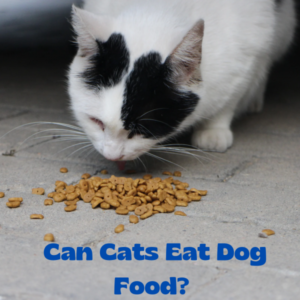
This is a typical query that is asked during a veterinary visit. The quick answer is that a cat can consume modest amounts of dog without experiencing any toxicity or long-term consequences. The extended response, however, delves into the variations between our canine and feline pals that are peculiar to their respective species. A nibble of stolen dog food won’t hurt cats, but it won’t help them maintain their best health either.
No, cats cannot survive on a diet of dog food.
If a cat is given just dog food for an extended period of time, negative, even fatal, effects may result.
Due to the differing nutritional requirements of these two species, dog food and cat food recipes have different nutritional ingredients.
Dogs and Cats Need Different Types of Nutrition
Although we share our hearts and homes with both dogs and cats, nature has shaped them through time into very different animals with very different dietary needs.
Cats are obligate carnivores, which implies that all of their bodily functions depend on a diet rich in animal fats and proteins from meat.
In contrast, dogs are actually omnivores. An omnivore can readily eat both meat and vegetables and has a more adaptable diet. Diets based on dog food do not satisfy the unique nutritional requirements of cats.
What Makes Cat Food Different from Dog Food?
Taste
Dogs and cats have differing perceptions of flavour. In contrast to dogs, cats are unable to detect sweetness, and even the amount of taste receptors between the two species varies.
In comparison to humans, who have over 9000 taste buds, cats only have 470, while canines have 1700.
In order to get our occasionally fussy (and taste-bud-deficient) feline pals to eat, cat meals are specifically designed to be extremely appetising.
Protein
Cats need food with a far higher protein level than does dog kibble because they are severe carnivores by nature.
Rare brands and dog food varieties do have more protein, but overall, not even these specialty dog foods contain the quantity of protein required to keep cats healthy.
The majority of dog feeds include 18 to 26 percent “As-Fed” protein. However, I often advise aiming for at least a “As-Fed” protein percentage of 30%–34% for cats, with the possibility of adding canned cat food with a protein content of 40%–50%.
Taurine
A few mammals, including cats and humans, are unable to produce taurine, thus they must obtain this necessary substance through diet.
Cats who don’t consume enough taurine can develop:
- vulnerable hearts (dilatated cardiomyopathy)
- absence of vision
- digestive issues
Taurine is now incorporated to every commercially available cat food product; however, it is rarely present in dog food.
Arachidonic Acid
Cats also cannot produce arachidonic acid; instead, they must consume it.
Low amounts of arachidonic acid in cats can cause generalised sickness symptoms like:
- abnormal liver and kidney function
- Occasionally, more skin problems
Since dogs can produce this fatty acid on their own, it is rarely added to dog food.
Vitamin A
Another nutrient that cats are unable to manufacture on their own and must be supplemented in their diet is vitamin A.
While vitamin A supplements are frequently found in dog meals, they are never present in sufficient quantities for optimal cat nutrition.
Cats who don’t get enough vitamin A will have:
- Coats of poor quality
- muscle atrophy and weakness
- possibly going blind at night
Niacin
Niacin must be included in a cat’s diet because cats cannot produce it on their own.
Niacin is most frequently derived from animal tissue, while plants sometimes contain small amounts of the vitamin. However, a meal with a lower percentage of animal tissue and a higher percentage of plant tissue, such grains, would not provide cats with the right amounts of niacin they require.
The Importance of High-Quality Cat Food
The greatest approach to make sure cats remain in our lives for a very long life is to make sure they eat a nutritious, high-quality diet designed specifically with feline needs in mind.
The nutritional requirements of cats are not met by dog food, despite the fact that it is nontoxic and won’t hurt an animal if a few kibbles are consumed.

